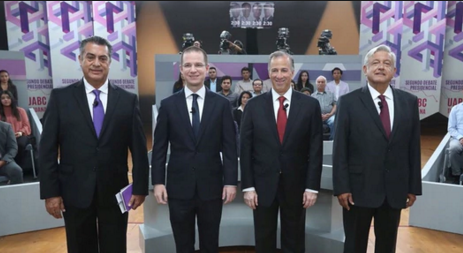In countries with less sensitive problems because of low pensions, presidential aspirants usually propose improvement measures, general reforms to mitigate disadvantages for former workers, and modifications aimed to avoid poverty for those who are still active. In Mexico, candidates to executive power have not expressed their proposal, if they have it, to rectify the expected retirement conditions of affiliates to the local pension system, SAR.
Insufficient pensions for current workers are expected, even with higher contribution
What do we have to ask to candidates? In some opportunities it has been repeated that with current mandatory contribution (CR) and applying composed profitability, the pretended replacement rate (RR) of workers could be as higher as 26%, clearly exiguous to lead a decent life. If the CR were to be increased now to 14% –a net rate of 13.0% after fees– and the annual weighted average profitability were 4%*, those who began their working life along with the SAR and accumulate uninterrupted contributions and returns in 21 years could consider their pension will be equivalent to around 45.5% of their last salary (or 53% if we assume annual returns of 5% instead of 4%). The 45.5% of RR is the consequence that half of the active life of these affiliates has already gone (so, 0.5% of active life over 26% of expected RR = 13%), and of taking into account that the new quota plus the next profitability would only influence the remaining years of work, provided that they do not go through periods of unemployment (so, 0.5% over RR of 65.0%= 32.5%).
If we start from the basis that the reform to the Chilean system was proposed by the fact that the RR of retirees did not reach the 80% projection of their last salary, this supposed increase in the CR of the SAR would be clearly insufficient for the Mexican workers’ pension to meet the necessary expenses in their retirement. Under these parameters, those who have few time of affiliation could aspire to higher pension tan 45.5%. In its case, the expectation of RR of 65% (through annual returns of 4%) or 80% (through returns of 5%) could only be reached by the new affiliates, those who began to work together with the application of the new CR.
With this simple thought –and the mirror of the Chilean model–, it can be realized that the increase of 115% of the contribution, from 6.5% today, without other complementary measures, would not solve the trouble of those who already have a working path. Assuming that the pension equivalent to 65% of salary, trough returns of 4% it would be taken as adequate by the future affiliates then it is clear that two kind of measures have to be determined; if that were not the case, there would be more problems and more solutions would have to be demanded.
Inquire to candidates in the remainder of the campaign
In the way that it is worrisome the candidates have not spoken, it baffles that those affected, nor the media, have demanded proposals or ideas for amendment. In other countries, a large proportion of voters decide according to pensions.
It would be believed that the man who was minister of Finance (in two six-year terms) would be able to make proposals or outlines of corrective projects; not just because his technical career but also because the influence he had over Comisión Nacional de Ahorro para el Retiro: the head of Finance is member of the Governing Board of the Commission, which in turn is attached to the ministry as a decentralized body. Even with that he has not made a single allusion to SAR.
That does not exempt the other aspirants, that considering they do not have experience in the sector are supported by teams that know the issues and worrying aspects of the country, and could be sensitive to the problem and commit to amend it.
The insufficiency of the RR is one of the concerns, but not the only one, about the pension system. There are other pending. Is exposed because it is the core, which will constitute the pension itself, the amount on which the sustenance will depends since retirement. In the remainder of the campaign, it is desirable that workers, media and academics inquire about it to the candidates.
____________________
* Please see “Aumento en la Contribución del Sistema de Retiro en Chile: Beneficios e Implicaciones”, Fitch Ratings. October 16, 2017.
Column by Arturo Rueda. English version by the author
